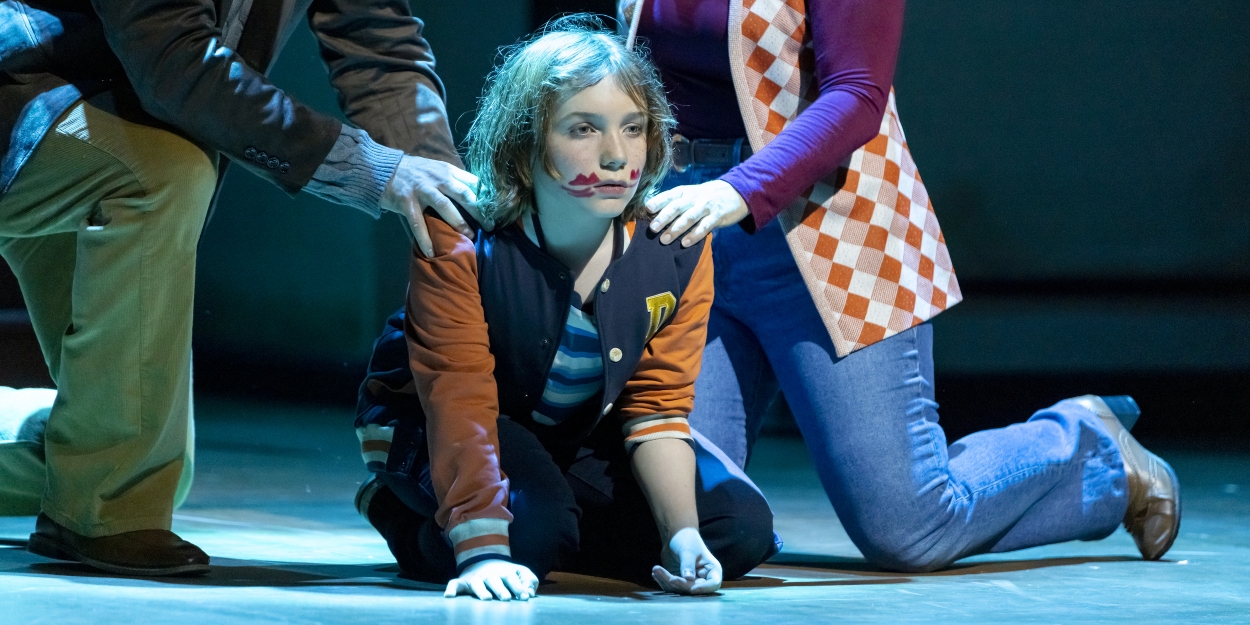Feature: A SHINING East Coast Premiere in Atlanta for Moravec and Campbell's Operatic Re-Telling of the Stephen King Novel
Atlanta Opera Joins with Alliance Theatre Company for a Scary-Good Piece of Musical Theatre

Stephen King’s novel “The Shining” has become an opera by Paul Moravec and Mark Campbell having its East Coast premiere this week as a co-presentation of Atlanta Opera and the Alliance Theatre.
Nearly a decade ago, when composer Paul Moravec and librettist Mark Campbell started work on an operatic version of Stephen King’s novel “The Shining” for the Minnesota Opera they were dealing with one of the most popular psychological thrillers of the 20th century—as well as one of the scarier movies of the ‘70s.
When I asked Campbell whether he was intimidated about the project, he stared at me blankly, “Are you kidding?” Though he hadn’t read the novel (or any King novel) itself when he was first offered the assignment, he knew it by reputation: After all, it’s a property that’s very familiar to so many people—for better or worse.
Many just know it from King’s 700-page novel (which Campbell whittled down to less than a tenth the size in the libretto, using his amazing economy of words). Of course, many more are familiar with Stanley Kubrick’s film version, which was infamously disliked by author King for its deviations from the original, including its off-the-wall performance by Jack Nicholson.
But when it came to writing the opera, the collaborators went back to the beginning: For Campbell, that meant digging into the novel because when he works there’s no question of “which comes first, the chicken or the egg?” “The libretto comes first. Always—starting with an outline until every transition in the story is set. Then it goes out to the composer, the director, the producer, etc., to make sure they’re on the same page. If anyone says, “I don’t understand what’s going on in Scene 4, I go back and fix it.”
Moravec and Campbell became a “dream team” with THE SHINING—they’re a mutual admiration society--and it’s continued through a series of oratorios, including SANCTUARY ROAD, based on the writings of William Still, which more recently became a full-fledged opera. An upcoming work is about the history of voting rights that should debut next year at Carnegie Hall with the Oratorio Society of New York.
“Here’s the thing about collaborations, words and music,” Moravec (whose style has been called “accessible” and “electrifying”) told me. “The written text has its own logic, the story has its logic and the music has its own. But they’re all separate, with different ways of thinking. It’s up to the librettist and composer to join them together into one, fused into a single creature.” He comments, “It’s a terrific collaboration because Mark is so good at this and if I can’t set something after I really try, he trusts my judgment and ‘makes accommodations.’”
The version being seen in Atlanta was first done for Opera Parallele in San Francisco, with the same director, Brian Staufenbiel, using a reduced orchestration by Moravec from the original 65 instruments to 22: Instead of multiple winds and brass, there are singles; there’s a smaller string section and a synthesizer has taken over for the harp (“which sounds great,” says the composer, a Pulitzer-prize winner). According to Campbell, “Paul has done a masterful job in the new orchestration. You still have all the themes of grand opera, without reducing its power. That remains the same.”
Part of the reasoning for the cuts was to open the possibilities of productions in smaller theatres, but, according to both the composer and the director, reducing the scale turned out to be a bonus for the work, which has already had many productions in both its forms. Campbell says, “It’s scarier, because the audience is closer to the action,” while Moravec adds, “It’s rawer and more in-your-face, like you’re in your living room—or in the hotel where the action takes place.”
Music-wise, the opera hasn’t changed much from the 2016 premiere at Minnesota Opera, under director Eric Simonson, in a version that's only suitable for the largest houses. The main difference was the addition of an aria for Jack, who is the center of the story; originally, the collaborators thought that his constant stage presence was enough to pull off the character but they came to realize it wasn’t. Otherwise, there were only a few cuts to make it tighter in the scene transitions. (And, of course, the incorporation of the ideas of director Brian Staufenbiel in the new production.)
“People may come because of the Kubrick movie, but they soon realize this isn’t Jack Nicholson running around with an ax,” says Moravec. “It’s more interesting because its more Stephen King. I’ve watched the audience at performances and I can honestly say they’re riveted—they forget they’re watching ‘an opera’. That’s what I like, what I want—to make them feel good about the way we’re telling the story, the people, the action.”
Concludes Campbell, “THE SHINING has the classic idea of opera. It’s essentially a tragedy about a man who wants to do good and cannot, a story that’s common in opera. So it has all the classical elements that we love from the opera canon but it’s a contemporary story, a contemporary American story, that will move audiences—while it’s scaring them.” He adds, “One thing opera can do that words alone can’t is to plumb the depths of humanity. It’s been proven time and again, with operas like LUCIA DI LAMMERMOOR, with their mad scenes. This kind of material is better sung, scarier sung.”
Photo: Max Walls as Danny Torrance by Rafterman/for The Atlanta Opera
THE SHINING will be performed at the Alliance Theatre’s Coca-Cola Stage at the Woodruff Arts Center for 11 performances from September 15 through October 1. See Atlanta Opera’s website for more details about remaining tickets.
Comments

Videos

